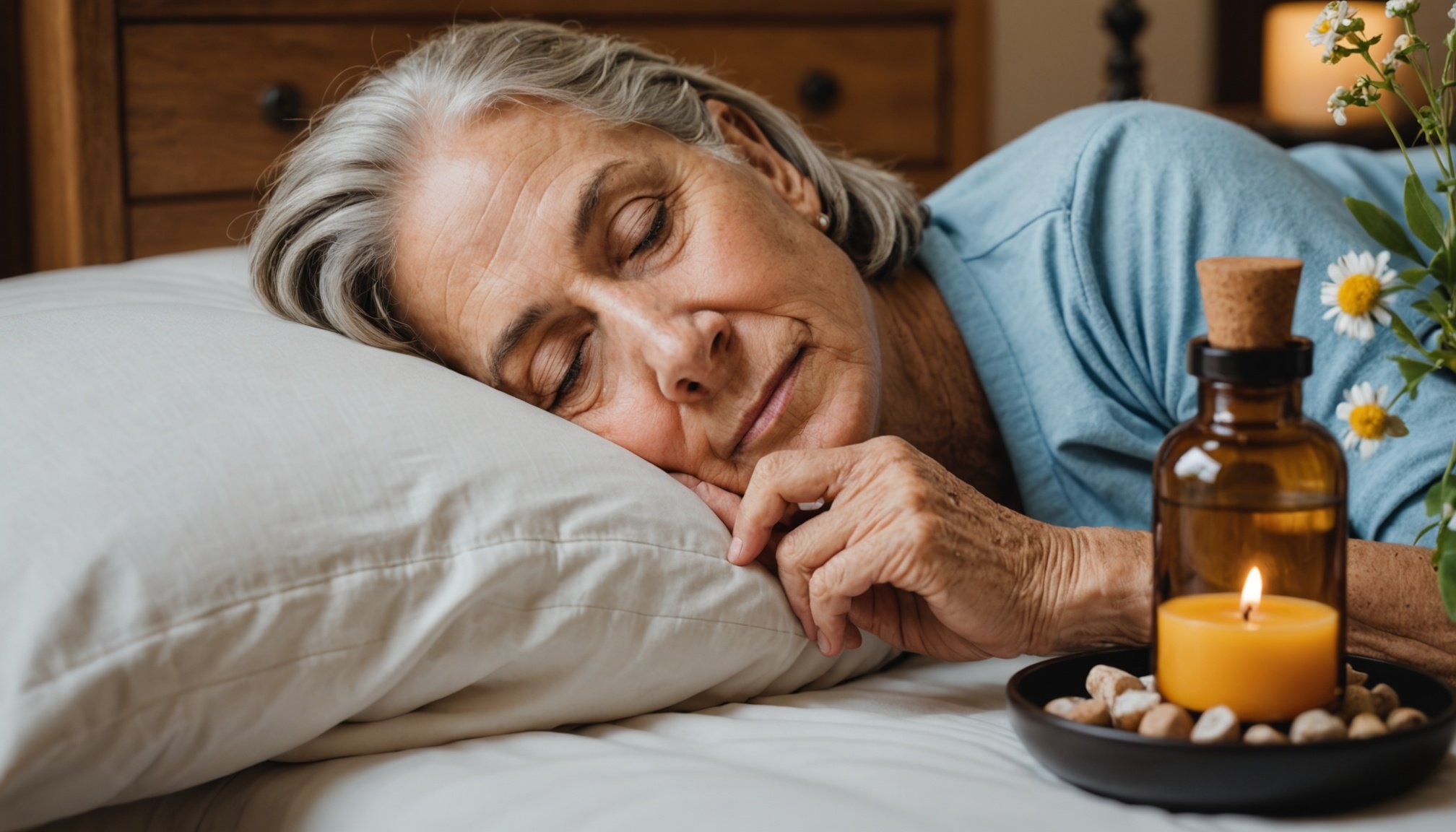Unlocking Peaceful Slumber: A Senior’s Guide to Enhancing Sleep Quality with Aromatherapy
The Importance of Sleep for Seniors
As we age, the quality of our sleep often deteriorates, leading to a range of health issues that can significantly impact our quality of life. Sleep is crucial for our body’s repair and rejuvenation processes, and it plays a vital role in maintaining both physical and mental health. For seniors, good sleep quality can help manage chronic conditions, improve cognitive function, and reduce the risk of falls and other accidents.
“Sleep is the best meditation,” says Dalai Lama, highlighting its importance in our overall well-being. However, many seniors face challenges in achieving a restful night’s sleep due to factors like stress, anxiety, and physical discomfort.
In parallel : Empowering Seniors 75+: Safe Strength Training Strategies for Active Living
Understanding Sleep Patterns in Seniors
As people age, their sleep patterns often change. Here are some common issues seniors may encounter:
Changes in Sleep Cycles
- Seniors may experience a shift in their sleep-wake cycle, known as advanced sleep phase disorder, where they feel tired earlier in the evening and wake up earlier in the morning.
- The quality of deep sleep, which is essential for physical and mental restoration, tends to decrease with age.
Health Conditions
- Chronic health conditions such as arthritis, diabetes, and cardiovascular disease can disrupt sleep.
- Medications used to treat these conditions can also interfere with sleep quality.
Lifestyle Factors
- Lack of physical activity, social isolation, and poor sleep environment can all contribute to poor sleep quality.
How Aromatherapy Can Help
Aromatherapy, the use of essential oils derived from plants, has been shown to be a powerful tool in improving sleep quality. Here’s how it can help:
Also read : Essential Tips for UK Seniors Over 60: Navigating Long-Distance Travel with Chronic Medications
Relaxation and Stress Reduction
Aromatherapy can help reduce stress and anxiety, common barriers to a good night’s sleep. Essential oils like lavender, chamomile, and bergamot have calming properties that can soothe the mind and body.
“Lavender fine, for example, is recognized for its calming properties and can help regulate sleep cycles,” notes an article on aromatherapy in senior care facilities[5].
Improving Sleep Environment
Creating a sleep-conducive environment is crucial for better sleep. Here are some ways aromatherapy can enhance your sleep environment:
Essential Oils for Better Sleep
- Lavender Oil: Known for its calming effects, lavender oil can help you fall asleep faster and improve the quality of your sleep.
- Chamomile Oil: This oil has anti-inflammatory and soothing properties that can help reduce anxiety and promote relaxation.
- Bergamot Oil: Bergamot has a calming and uplifting effect, which can help reduce stress and anxiety.
| Essential Oil | Benefits for Sleep |
|
|--------------------|
| Lavender | Calming, promotes relaxation, improves sleep quality |
| Chamomile | Reduces anxiety, anti-inflammatory, soothes the mind and body |
| Bergamot | Reduces stress and anxiety, promotes relaxation |
Techniques for Using Aromatherapy
Here are some practical ways to incorporate aromatherapy into your bedtime routine:
Diffusion
- Use an essential oil diffuser in your bedroom to spread the calming aroma of the oils throughout the room.
Topical Application
- Mix a few drops of essential oil with a carrier oil like jojoba or coconut oil and apply it to your skin before bed. For example, you can apply lavender oil to your temples or the soles of your feet.
Bath Time
- Add a few drops of essential oil to your bath water before bed. The warm water and the aroma of the oils can help you relax and prepare for sleep.
Inhalation
- Inhale the aroma of the essential oils directly from the bottle or through steam inhalation. This can be particularly helpful if you wake up during the night and need to fall back asleep.
Additional Techniques to Improve Sleep Quality
While aromatherapy is a powerful tool, it is often most effective when combined with other sleep-enhancing techniques.
Bedtime Routine
Establishing a consistent bedtime routine can signal to your body that it is time to sleep. Here are some components of a good bedtime routine:
- Meditation and Deep Breathing: Practices like meditation and deep breathing can help calm your mind and body.
- Reading or Listening to Soothing Music: Engage in relaxing activities that do not involve screens.
- Cooler Room Temperature: Keep your bedroom cool, as a cooler environment can promote better sleep.
- Weighted Blankets: Using weighted blankets can provide a sense of security and comfort, helping you fall asleep faster.
Sleep Schedule
Maintaining a consistent sleep schedule is crucial for improving sleep quality. Here are some tips:
- Go to Bed and Wake Up at the Same Time: Consistency helps regulate your body’s internal clock.
- Avoid Naps Close to Bedtime: While naps can be helpful, avoid them in the late afternoon or early evening.
- Limit Exposure to Screens Before Bed: The blue light from screens can interfere with your body’s production of melatonin, the sleep hormone.
Reducing Stress and Anxiety
Stress and anxiety are significant barriers to good sleep. Here are some ways to reduce them:
- Exercise Regularly: Physical activity can help reduce stress and improve sleep quality. However, avoid vigorous exercise close to bedtime.
- White Noise: Use white noise machines or apps to create a constant, soothing sound that can help mask other noises that might disturb your sleep.
- Journaling: Writing down your thoughts and feelings before bed can help clear your mind and reduce stress.
Creating a Sleep-Conducive Environment
Your sleep environment plays a critical role in the quality of your sleep. Here are some tips to create a sleep-friendly environment:
Dark and Quiet
- Ensure your bedroom is dark and quiet. Use blackout curtains and earplugs if necessary.
Comfortable Bedding
- Invest in a comfortable mattress and pillows. Replace them regularly to ensure they remain supportive.
Cool and Ventilated
- Keep your bedroom cool and well-ventilated. A cooler environment can promote better sleep.
Practical Advice and Examples
Here are some practical tips and examples to help you integrate aromatherapy and other sleep-enhancing techniques into your daily routine:
Example Bedtime Routine
- 6:00 PM: Start winding down with a warm bath infused with a few drops of lavender oil.
- 7:00 PM: Practice some light stretching or yoga to relax your muscles.
- 8:00 PM: Engage in a relaxing activity like reading or listening to soothing music.
- 9:30 PM: Use a diffuser with chamomile oil in your bedroom to create a calming atmosphere.
- 10:00 PM: Go to bed and use deep breathing techniques to fall asleep.
Real-Life Example
Mrs. Johnson, a 75-year-old retiree, struggled with insomnia due to chronic back pain and stress. She started using aromatherapy by adding a few drops of lavender oil to her bath water and using a diffuser in her bedroom. She also established a consistent bedtime routine that included meditation and deep breathing. Within a few weeks, she noticed a significant improvement in her sleep quality and overall well-being.
Improving sleep quality is a multifaceted approach that involves creating a conducive sleep environment, reducing stress and anxiety, and using relaxation techniques like aromatherapy. By incorporating these methods into your daily routine, you can enhance your sleep quality, leading to better health and a more fulfilling life.
As Dr. Andrew Weil, a renowned expert in integrative medicine, notes, “The best way to get started with aromatherapy is to experiment with different essential oils and see what works best for you.” So, take the first step today, and unlock the power of peaceful slumber with aromatherapy.











